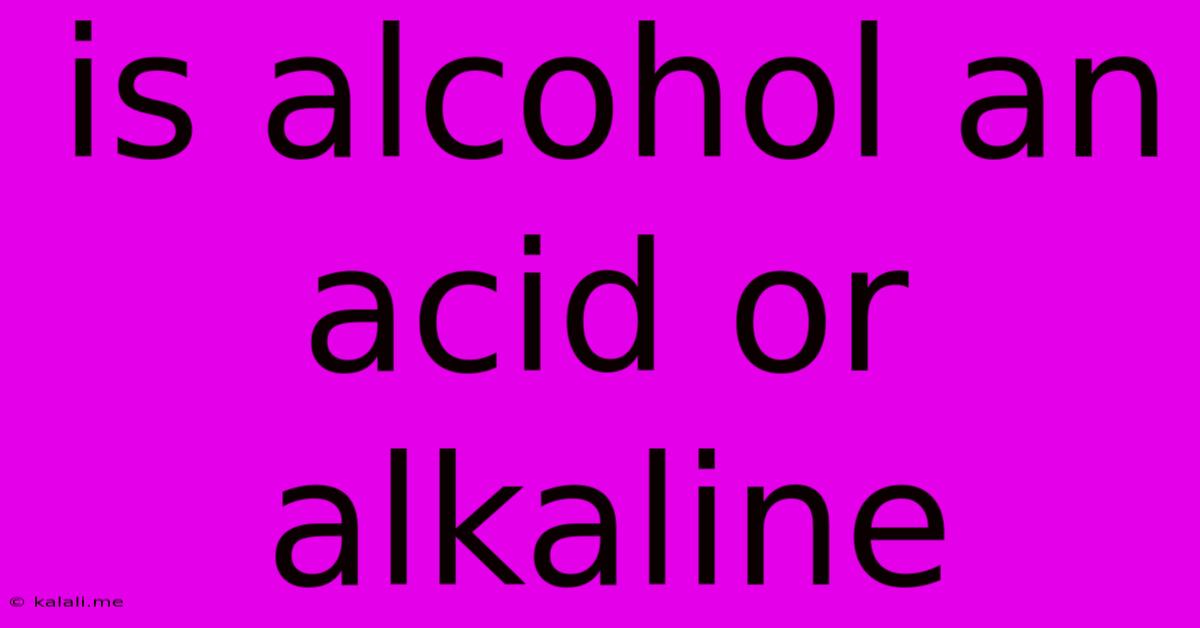Is Alcohol An Acid Or Alkaline
Kalali
May 22, 2025 · 2 min read

Table of Contents
Is Alcohol an Acid or Alkaline? Understanding the pH of Alcohol
Many people wonder about the chemical nature of alcohol. Is it an acid, a base, or something else entirely? The answer isn't as simple as a straightforward "acid" or "alkaline," and depends heavily on the specific type of alcohol and its concentration. This article will delve into the pH of alcohol and explore its behavior in different contexts.
The pH scale measures how acidic or alkaline a substance is, ranging from 0 to 14. A pH of 7 is neutral, below 7 is acidic, and above 7 is alkaline (or basic). Pure water has a neutral pH of 7. While many believe alcohol to be acidic, the reality is more nuanced. Most alcohols, particularly ethanol (the type found in alcoholic beverages), are nearly neutral. Their pH is typically very close to 7.
Ethanol and its pH
Ethanol, the primary alcohol in alcoholic drinks like beer, wine, and spirits, has a pH that's generally considered neutral, though slight variations can occur depending on factors like purity and the presence of other substances. The production process, aging, and additional ingredients (such as sugars or acids in wine) can subtly influence the final pH. However, these variations are typically minimal and don't dramatically shift the overall neutrality of ethanol.
Other Alcohols and their pH Levels
It's crucial to remember that "alcohol" isn't a single substance. Many different types of alcohols exist, each with its unique chemical properties. While ethanol is generally neutral, other alcohols may exhibit slightly acidic or alkaline tendencies depending on their molecular structure. For example, some alcohols might contain functional groups that contribute to acidity or basicity. This is not typically relevant for the common understanding of alcohol's effect on the human body.
The Impact of Alcohol on the Body's pH
While alcohol itself is near-neutral, consuming large amounts of alcohol can indirectly affect the body's overall acid-base balance. This is not due to the alcohol's pH directly, but rather its metabolic byproducts. The liver processes alcohol, creating acidic byproducts that can temporarily lower the blood's pH, leading to a state of acidosis. This is a temporary effect, and the body usually regulates its pH back to normal after the alcohol is metabolized. However, chronic alcohol abuse can severely strain the body's ability to maintain proper pH balance, resulting in more serious health consequences.
Conclusion: A Neutral Perspective
In conclusion, while the exact pH of alcohol can vary slightly depending on the type and additional components, ethanol – the alcohol most relevant to human consumption – is generally considered neutral. Its impact on the body's acid-base balance is indirect, stemming from metabolic byproducts rather than its inherent pH. Understanding this distinction is crucial for a more accurate and informed perspective on alcohol's chemistry and its effects on the human body. Always consume alcohol responsibly and in moderation.
Latest Posts
Latest Posts
-
Sony A Mount To E Mount Adapter
May 22, 2025
-
The Crack In The Wall Dr Who
May 22, 2025
-
Where Is The Jail In Gta 5
May 22, 2025
-
Does Krazy Glue Work On Fabric
May 22, 2025
-
How To Address A Professor In An Email
May 22, 2025
Related Post
Thank you for visiting our website which covers about Is Alcohol An Acid Or Alkaline . We hope the information provided has been useful to you. Feel free to contact us if you have any questions or need further assistance. See you next time and don't miss to bookmark.